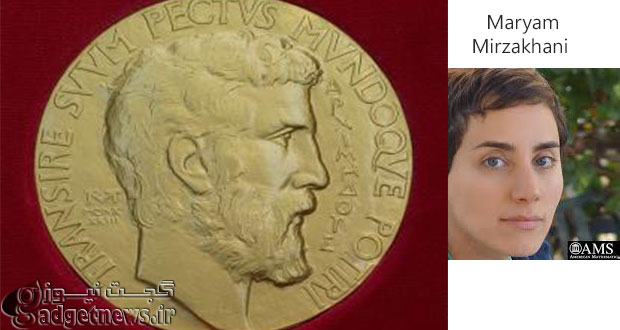جایزه ی نوبل یه ریاضیات تعلق نمی گیرد، بنابراین بالاترین جایزه ی ریاضیات، یعنی مدال فیلدز را نوبل ریاضیات می نامند. این برای نخستین بار است که یک زن این مدال با ارزش را دریافت می کند. مریم میرزاخانی، ریاضی دان جوان ایرانی، از دانشگاه استفورد، امروز در کنگره ی ریاضیات در سئول، مدال فیلدز را دریافت خواهد کرد که این بالاترین افتخار برای یک ریاضیدان محسوب می شود.
این مدال هر 4 سال یکبار به ریاضیدانی زیر 40 سال اهدا می شود. تمام 52 برنده ی قبلی این مدال از سال 1936، مرد، بوده
اند. میرزاخانی روی هندسه ی فضای مدولی که ماهیت جبری و هندسی پیچیده ای دارد، مطالعه می کند.
او طی تحصیل در دبیرستان فرزانگان تهران در سالهای ۱۹۹۴ (هنگکنگ) و ۱۹۹۵ (کانادا) برنده مدال طلا در المپیاد جهانی ریاضی و در این سال حایز نمره کامل شد. سپس کارشناسی ارشد خود را در رشته ریاضی از دانشگاه شریف گرفت و برای ادامه تحصیل دکترا به دانشگاه هاروارد رفت.
از مریم میرزاخانی به عنوان یکی از ده ذهنِ جوان برگزیده سال ۲۰۰۵ از سوی نشریه پاپیولار ساینس در آمریکاو ذهن برتر در رشته ریاضیات تجلیل شد. میرزاخانی برنده جوایزی چون جایزه ستر از انجمن ریاضی آمریکا در سال ۲۰۱۳، جایزه کلی و مدال فیلدز در سال ۲۰۱۴ است. وی از یازدهم شهریور ماه ۱۳۸۷ (اول سپتامبر ۲۰۰۸) در دانشگاه استنفورد استاد دانشگاه و پژوهشگر رشته ریاضیات است. پیش از این، او استاددانشگاه پرینستون بود.
منبع: newscientist
Iranian woman wins maths' top prize, the Fields medal
Iranian woman wins maths' top prize, the Fields medal
A woman has won the maths world’s “Nobel prize” for the first time. Maryam Mirzakhani of Stanford University, California, will receive the Fields medal tomorrow at the International Congress of Mathematicians in Seoul, South Korea. The medal is awarded once every four years to at most four recipients, who must be aged under 40 at the start of that year. All the previous 52 Fields medallists, dating back to 1936, have been male. Mirzakhani, who is Iranian, studies the geometry of moduli space, a complex geometric and algebraic entity that might be described as a universe in which every point is itself a universe. Mirzakhani described the number of ways a beam of light can travel a closed loop in a two-dimensional universe. To answer the question, it turns out, you cannot just stay in your “home” universe – you have to understand how to navigate the entire multiverse. Mirzakhani has shown mathematicians new ways to navigate these spaces. Mirzakhani first attracted international attention as a high-school student in 1995, when she was the first Iranian student to achieve a perfect score in the International Mathematics Olympiad. “She is very, very well known in Iran, where she is held out as an example for younger students,” says Ingrid Daubechies, the president of the International Mathematical Union, which selects the Fields medallists. “Speaking as a woman myself, it is a wonderful thing to see her win,” Daubechies adds. “It will lay to rest the often-quoted fact that a woman has never won.” In future, she says, the idea of a woman winning the top maths award will no longer seem exceptional. The three other winners are Brazilian-born Artur Avila of Denis Diderot University in Paris, France, who studies how chaotic systems evolve when constrained by certain rules; Manjul Bhargava, a number theorist at Princeton University; and Martin Hairer, an expert in partial differential equations at the University of Warwick, UK.
 گجت نیوز آخرین اخبار تکنولوژی، علم و خودرو
گجت نیوز آخرین اخبار تکنولوژی، علم و خودرو 






